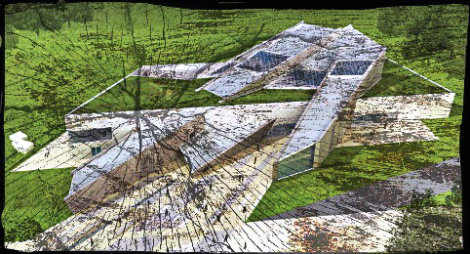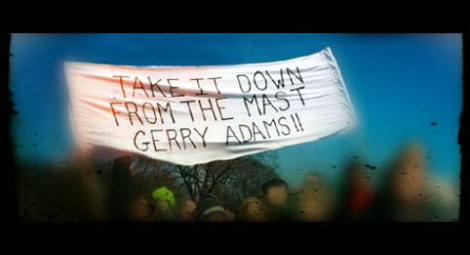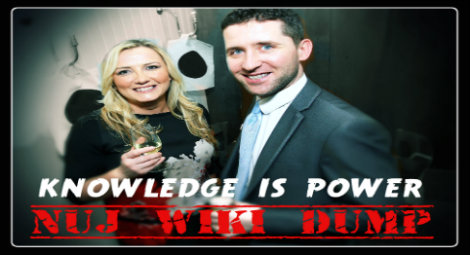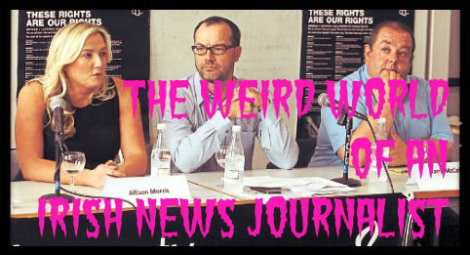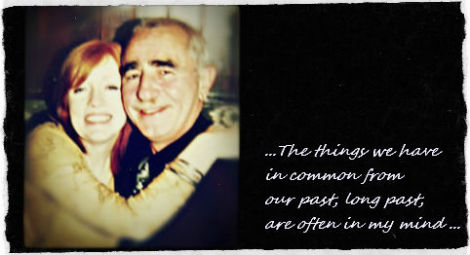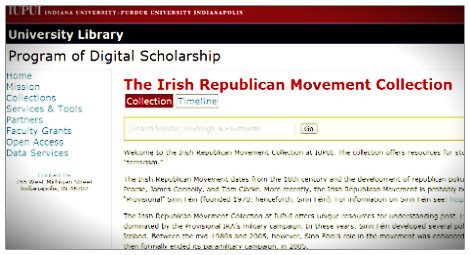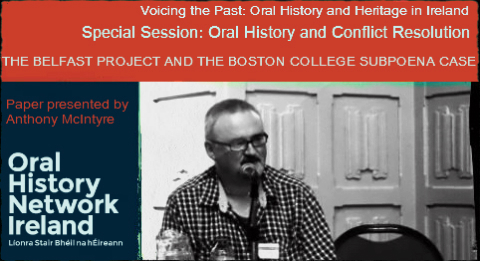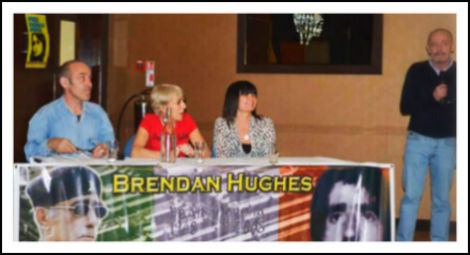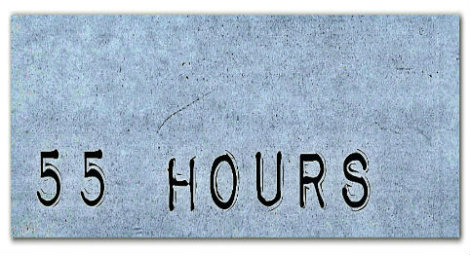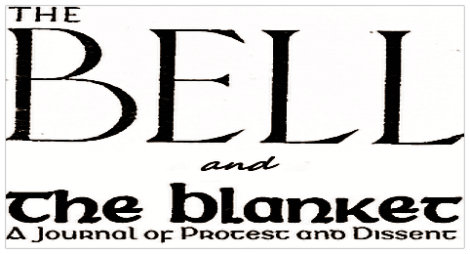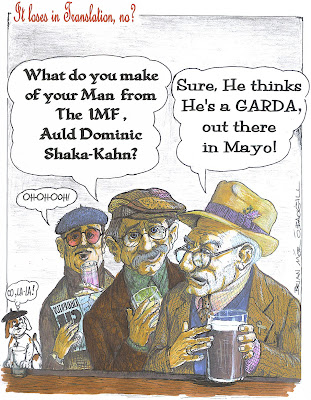Wiki-Dump
All correspondence in relation to Allison Morris' and Ciaran Barnes' complaints and the NUJ's handling of the issue.
Dolours Price Archive
"I look forward to the freedom to lay bare my experiences unfettered by codes now redundant."
Irish Republican Movement Collection
Annoucing the Irish Republican Movement Collection online archive at IUPUI
The Belfast Project and Boston College
The Belfast Project and the Boston College Subpoena Case: The following paper was given at the Oral History Network of Ireland (OHNI) Second Annual Conference in Ennis, Co Clare on Saturday the 29th September 2012
Challenge and Change
Former hunger striker Gerard Hodgkins delivered the 2013 annual Brendan Hughes Memorial Lecture
Brendan Hughes: A Life in Themes
There is little to be gained in going from an A to Z chronological tour of the life of Brendan Hughes. The knowledge is out there. Instead a number of themes will covey to those who are interested what was the essence of the man.
55 HOURS
Day-by-day account of events of the 1981 Hunger Strike. A series in four parts:
July 5 ● July 6 ● July 7 ● July 8
The Bell and the Blanket
Journals of Irish Republican Dissent: A study of the Bell and Blanket magazines by writers Niall Carson and Paddy Hoey
Tuesday, May 31, 2011
Tuesday, May 24, 2011
Training For Hate
The Macpherson Inquiry into the police handling of the 1993 murder of black teenager Stephen Lawrence in England concluded that there was an institutionalised racism within the Metropolitan Police. All being equal before the law was immediately devalued when the first point of contact with the law was the police. Whatever happened after that was compromised. With police fingerprints all over the initial investigation anything subsequent was a question of where the loaded dice might fall. It seems that something similar can be said of US police and that institutional bias is being deliberately fostered at management level.
An article by Meg Stalcup and Joshua Craze titled ‘How We Train Our Cops to Fear Islam’ might seem a bit OTT although the objection from Congressman Peter King is likely to be that the article should be called ‘How We Must Train Our Cops To Fear Islam. Cops have their fears. And what people fear they tend to hate. Anyone who has faced the RUC at protests or republican funerals knows that much as they were forced to peer into hate contorted faces, their bearers itching to baton, beat or fire a plastic bullet at a child from a nationalist family. But to state that stoking fear of a law abiding community is part of their police training sounds a bit much. It seems counterproductive and sort of gives the game away before the first foul tackle goes in. Normally, we expect the human rights discourse to be in play. It acts as the alibi when accusations of abuse emerge: ‘not us, Joe Public, look at our human rights ethos.’
The Stalcup and Craze article detailed training being given out to US beat-cops by people who pass themselves off as "terrorism experts". Despite the global recession there is no shortage of work in the terrorism industry. It has been constant since 9/11: ‘rivers of federal training dollars are already flowing, many of them straight into the pockets of instructors like Sam Kharoba.’
At a college in Florida in January 2010 Sam Kharoba, an independent consultant in the industry, took his place in front of a class of 60 cops. He promised to teach his students over the course of three days the fundamentals of Islam. One ‘myth’ he set out to explode was that Islam was a peaceful religion. He told his class that since 9/11 there had been ‘over thirteen thousand attacks.’ Extremist Muslims could, he assured his listeners, be spotted as easily as members of the numerous street gangs with their colours that flourish in many US cities.
“When you see a bunch of guys in red, what do you know?” Kharoba asked.
“They are Bloods,” responded the audience, many of whom deal with gangs regularly.
“When you have a Muslim that wears a headband, regardless of color or insignia, basically what that is telling you is ‘I am willing to be a martyr. … The first thing is facial hair … Do you see how the moustache is trimmed, and the beard is in a cone shape? It is very common to have this beard, and the moustache will always be the same, just like Muhammad.”
This type of thing obviously had an effect. According to the authors of the article, Meg Stalcup and Joshua Craze:
When we spoke to students from Kharoba’s class in Florida, many were enthusiastic. Olga Gonzalez, who is a TSA officer in Miami, told us she had taken several of Kharoba’s courses. “This guy is brilliant,” she said. “I can’t believe it: just like gang affiliations, you can distinguish between secular and jihadist Muslims.”
Kharoba, who argues that ‘the best way to handle these people is what I call legal harassment’ seeks to ensure that cops don’t discriminate between good and bad Muslims. ‘Islam is a highly violent radical religion that mandates that all of the earth must be Muslim.’
While there is plenty of room for discussion about the type of religion Islam is and how it might compare against other global religions, hate mongering has no place in rational discussion.
During his classes Kharoba would refer to the infamous Alligator Ally incident where three Muslims in a car were pulled over by the police and detained after a woman diner eavesdropping on their conversation picked up the words ‘bring it down.’
Using this to set the scene Kharoba would project a picture of Ayman Gheith, one of the arrested men, onto the screen and tell his audience:
the first thing is facial hair … do you see how the moustache is trimmed, and the beard is in a cone shape? It is very common to have this beard, and the moustache will always be the same, just like Muhammad
But as the article points out:
There is only one problem with the Alligator Alley case—a problem Kharoba never mentioned to the class. The incident was a false alarm. The “terrorists” turned out to be medical students on their way to a conference in Miami. They were innocent. After thirteen hours of interrogation, the police released them. Kharoba, however, taught the class that Ayman Gheith was a “textbook case” of Islamic fanaticism.
Stalcup and Craze proceed to warn that:
Time is of the essence. Within the next year, the Department of Justice plans to implement the Suspicious Activity Reporting Initiative nationwide, and this will amplify the effects of the bad training being provided—unless the system is reformed quickly … But instead of a broader discussion, what we have now is a system that fails to police the ranks of those who train our frontline officers, while no one is paying attention. Apart, that is, from the police.
With Peter King was reported in the New Yorker singing the praises of torture in the wake of the Bin Laden assassination it was evident that the scene is being increasingly set for an ever more violent policing of a demonised community. Because of a law enforcement agency disinclination to differentiate largely because of training by tutors like Kharaba little benefit in terms of security and wellbeing for US citizens is likely to accrue.
Sunday, May 22, 2011
Friday, May 20, 2011
Windsor Visit
The 26-county state held a National Famine Commemoration ceremony on the 16th of May 2010, it was held at the Murrisk Millennium Park at the foot of Croagh Patrick.
At the ceremony an observation was read by Seamus O Connell of the Humanist Association; he said “as we remember the greatest calamity ever to befall this country, we may ponder on the mismanagement and neglect, as much as the failure of the potato crop”.
One group of people who could not take this chance to ponder the Irish holocaust was the representatives of the British state in the 26 counties. They chose not to attend.
Dublin government sources confirmed at the time that an invitation had been forwarded to the British embassy in Dublin.
As shameful and calculated a snub as you will find in international diplomacy.
Fourteen other nations among them China, Nigeria and Latvia sent representatives.
The Scottish Justice Minister Mr Kenny Mc Askill described a match held on the 20th of March 2011 at Hampden Park, Glasgow as “a great advert for Scottish football”. Assistant Chief Corrigan of the Strathclyde police stated “the atmosphere at the match was excellent”
At this particular sporting occasion thousands of those present sang songs among the lyrics of which are “we are up to our necks in Fenian blood, surrender or you die”. Another song audible from the television coverage mocks the Irish Famine and tells those of Irish extraction in Scotland “the Famine is over go on home”
It is an accepted norm in human relations of any kind that for people or groups to move beyond a certain level of relationship, issues which have caused hurt and conflict must be addressed. This requires honesty.
Today relations between Ireland and Britain are still blighted by British Imperialism and anti-Irish racism.
Those who really want to move the relations between Ireland and Britain on will commit to addressing the fundamental issue of British interference in Ireland.
The 23rd of March 2011 with a backdrop of rugby international between Ireland and England saw the following written by Martin Samuel being printed in one of the largest circulation newspapers in Britain, the Daily Mail.
Indeed there is a lot of history there(the relationship between Ireland and Britain). Like the European Union 73.7 billion bailout for the failing Irish economy last November, that could end up costing British taxpayers in the region of 6.07 billion. Not many songs about that on Saturday though, just the usual ones about prison ships, prison walls and a terrible famine which took place 160 years ago, yet is still thrown in the face of every visitor in an England shirt, as if it was cooked up in the Harlequins dressing room last Tuesday. Maybe next time Martin Johnson (England manager) visits he could give a rousing and equally relevant speech before the game based on vengeance for all the little kiddies abused by Ireland’s paedophile priests.
Samuel could write this without any fear of falling foul of hate crime legislation in Britain.
Given that the British monarchy is unavailable to certain citizens of Britain, because of their religion, out workings of that institutional discrimination are no surprise.
An apology by the British state and a withdrawal from the six counties would be a meaningful way of moving things forward.
A year ago, the same week as the proposed Windsor visit, the British state had an opportunity to make a small act of reconciliation. They chose not to.
Parading the largest landowner in Britain through the streets of a city mired in poverty, which will only get worse under the IMF regime, is shameful. It will move not one thing forward. What it will do is deny 8 million euro to youth, health and education services, to name just three. Among the costs is a banquet at which Windsor will be joined by the native elites, who have sentenced this generation and future ones to despair. The Windsor visit is wrong in many ways.
Wednesday, May 18, 2011
Appointment With Genocide
I had been through films and other books on this particular holocaust including factual works by Linda Melvern, Fergal Keane and Romeo Dalliare as well as Gil Countermarche’s brilliant novel, A Sunday By the Pool in Kigali, before tackling Gourevitch. To my dismay, in my reading experience there is no book so far encountered about the horrors of Rwanda that makes for easy reading. As Publishers Weekly asked about this one ‘who will read such a ghastly chronicle?' Each book, in their own way, narrates a story, to use a well clichéd term, of man’s inhumanity to man.
In Germany’s Willing Executioners Daniel Goldhagen sought to implicate the entire German people in the genocide against the Jews. He managed it much less successfully than Gourevitch did with his treatment of Rwanda. There, responsibility seemed much more collective, there were more people involved and not merely the Rwandan equivalent of the SS, even if the murderous Interhamwe were content to function with as much energy if less cohesion than Himmler’s Schutzstaffel.
A few lines into his book Gourevitch warns his reader that ‘it was the most efficient mass killing since the atomic bombings of Hiroshima and Nagasaki.’ All of it carried out to advance the agenda of Hutu Power. The genocide was of course prosecuted without the technology that went with those bombs. The rich nations commit hi-tech mass slaughter while the poor do it with machetes. The thought struck me that maybe Rwanda was less brutal in its holocaust than the US had been in 1945 when it rained death from the skies upon numerous Japanese civilians. In Rwanda the killing was face to face. Most people died in the first encounter and whatever ‘stragglers’ were left to agonisingly expire from, it was not the effects of radiation.
The history of Rwanda has been well documented elsewhere and is straightforward enough. The Belgians and the Catholic hierarchy between them ran the country for decades. Belgium introduced a rigid but false ethnicity of Hutu and Tutsi. Still, it was not until 1959 that real tension between the two groups took place. By the time of the genocide in 1994 Rwanda was a totalitarian society with the sinister akazu functioning as the strategic intelligence driving the totalitarianism of Hutu Power. Its management lay in the hands of the wife of the country’s Hutu president and her brothers. Gourevitch had his own particular description for her: ‘the Lady Macbeth of the Rwandan genocide.’ After the Arusha Accords were signed in 1993 and a power sharing arrangement devised, Hutu Power accused President Habyarimana of treason despite the presence of his fingerprints all over the genocide plan. When his plane was brought down by a rocket as it was descending into Kigali Airport it was the signal the genocidaires had been waiting for. The murders of Tutsis and Hutu moderates began immediately.
Gourevitch seeks primarily to have people talk. But his is not a neutral observation. He comes down firmly on the side of the brilliant Tutsi general and current Rwandan leader Paul Kagame. And some of those voices reveal so much. A survivor spoke of how Tutsis were psychologically conditioned for death:
When you’re that resigned and oppressed you are already dead. It shows the genocide was prepared for too long. I detest this fear. These victims of genocide had been psychologically prepared to expect death just for being Tutsi. They were killed for so long that they were already dead.
The army, police and organised death squads all played a methodical role. The men of god were up to their necks in it too. Rwanda was the most Catholicised country in Africa. 65 per cent of Rwandans were Catholics, 15 per cent Protestant. ‘Appearances’ of the virgin Mary were interpreted as urging genocide. Many clerics organised the mass murders. Others died defending their flocks. Seven Tutsi pastors worked to protect their congregation. They prayed to their god who duly ignored them and abandoned them to their fate at the hands of their fellow Christian. It is a letter written by one of them from which the book takes its name, We wish to inform you that tomorrow we will be killed with out families. Pastor Ntakirutimana announced to them ‘you must be eliminated. God no longer wants you.’ This monstrous man of god would later tell Gourevtich ‘I think I am closer to God than I have ever been in my life.’ I am sure he was. The infamous killer priest Father Wenceslas has received the backing of the Catholic Church. Bishop Misago the most senior member of the Church to be charged was eventually acquitted after pressure from the Vatican and letters to the court from the then pope, leaving survivors furious. Numerous nuns, priest and members of holy orders were through the jails for their role in butchering their neighbours. The sole community credited by one Christian leader with behaving quite well during the genocide was the Muslim. As a group it played no part in the genocide while the Christians slaughtered all round them. Its members tried to save the lives of Tutsis. So much for the evils of Islam that the decent Christian gentlemen of the West so insist upon being rooted out.
In a country where genocide was not regarded as a crime but the law of the land, five and a half lives were snuffed out every minute. Pygmies were on occasion used by the Hutu killers to rape Tutsi women, just to add an extra degree of humiliation to the victims before the machetes bore down on them to end their lives. ‘Doctors killed their patients and schoolteachers killed their pupils.’ Dante would have had difficulty conceiving it.
Despite the attempts of UN commander in Rwanda, Romeo Dallaire to alert the UN of what was about to come he was ignored. The UN deserted the victims. Dalliare said with 5000 men he could halt the genocide but his pleas went unheard. Gourevitch comments acerbically:
Rwanda had presented the world with the mot unambiguous case of genocide since Hitler’s war against the Jews, and the world sent blankets beans and bandages to camps controlled by the killers apparently hoping that everybody would behave nicer in the future.
Those so intent on bombing Libya today were conspicuously less committed to a humanitarian strike when the case for it could be made with greater effect than it could against the Gadaffi regime. The role of the French under Mitterand was disgraceful. Throughout the genocide France supplied the Génocidaire with weapons. When in the early 1990s it was clear that Hutu Power was carrying out ‘dress rehearsals’ for what Hutus called the ‘final solution’ the French along with Egypt and apartheid South Africa maintained the shipments. ‘From the moment they arrived and wherever they went the French forces supported and preserved the same local political leaders who had presided over the genocide.’
While President Sarkosy of France may today claim ‘a form of blindness when we failed to discern the genocidal dimension’ it grates that he can currently lead the bombing of Libya when his country’s recent history is one of conspiring with Hutu Power while strenuously working to depict the genocide as an act of anger: Rwandans were just killing Rwandans as they were inclined to do. Mitterand would say ‘in such countries genocide is not too important.’ Not even to those on the receiving end it seems.
Despite it being worst act of genocide since World War 2, there is no instantly recognisable face to put on it. That might help explain why ‘something immense happened, then vanished from our consciousness’ as Gourevitch told the Economist in 2010. It has become an amorphous black mass, reinforcing the myth that it is tribe against tribe and hardly the white man’s burden. No Hitler, no Milosevic, no Cromwell. Yet it was as well coordinated as anything the aforementioned triumvirate of butchers put its hand to. Theoneste Bagosora the prime mover is hardly a name that will register in many minds. And in this work Gourevitch does little to bring him to the fore, preferring to spend more time profiling Paul Kagame. How many biographies have appeared about this vile individual?
It is where Gourevtich seeks to endorse Kagame that he introduces a disquieting theme into his critique. He is critical of the human rights perspective that blaming all sides equally for atrocities may not be as sound a judgement as applying political judgement. This has added wind to the sails of those writers termed ‘genocide deniers’ such as Barrie Collins, whose questioning of the genocide narrative is facilitated by a failure to address the crimes of the Kagame led forces: ‘by seizing power, the RPF put an end to the militias’ killings of Tutsis, but they did not put an end to their own killings.’ Yet it is not merely genocide deniers who question the narrative of the Kagame regime. Four former senior members of the Kagame regime in a document called ‘Rwanda Briefing’ made the following damning indictment. Rwanda it boldly stated:
is a one-party authoritarian state, controlled by President Kagame through a small clique of Tutsi military officers and civilian cadres of the RPF from behind the scenes. The majority Hutu community remains excluded from a meaningful share of political power. State institutions are as effective as they are repressive. The government relies on severe repression to maintain its hold on power … Rwanda is less free today than it was prior to the genocide. There is less room for political participation than there was in 1994. Civil society is less free and effective. The media is less free. The Rwanda government is more repressive than the one that it overthrew.
This poses a challenge to the Gourevtich account because it seems likely that once the lopsided handling of human rights becomes entrenched a situation would develop where only some humans would have rights. A special brand of human would have emerge who would have more rights than anybody else. One outcome would surely flow from that. While there is probably not enough probing of Kagame’s role in this work Gourevtich was writing at a time when it was much harder to be definitive. Work since published has helped add the mosaic of complexity to an otherwise black and white board.
The planned genocide, which did happen and which can only be denied with the same power of logic that denies gravity, took place almost two decades ago. This book was published four years after it, but it continues to hold its own in terms of conveying horror. The Economist claims that it is taught in universities and remains a steady seller in Africa.
We wish to inform you that tomorrow we will be killed with out families. By Philip Gourevitch. Picador 1998
Monday, May 16, 2011
Language of Hate
Labelling Sinn Fein ‘scum’ is not far removed from the position of the deceased Scottish bigot George Seawright. How long before we hear Elliot calling for the burning of Catholics and their priests? As if to reinforce the point of how bigotry is blind, Elliot, for good measure, repeated his comments to the Belfast Telegraph. Bigotry is so natural to the man that he rests absolutely easy with it and displays not the slightest hint of embarrassment. And when he apologises to ‘good’ republicans he just means those he does not regard as scum.
Fermanagh from where he hails has a long line of prominent unionists every bit as bigoted as they were dull. It is where the ‘not a Catholic about the place’ had its origins. Harry West, who lost the 1981 by election to Bobby Sands, inspired only dullards of narrow outlook just like his own. It took the arrival of David Trimble, albeit hesitatingly, to put some sort of intellectual shine on the UUP and have it think outside the box. Elliot it seems is determined to undo that and in its place promote a Dawson Bailie style unionism.
It might be hard for Elliot to swallow the fact of his party’s lowly status. Outmanoeuvred and upstaged by both its erstwhile rivals in the Unionist laager and its one time (and still it seems) enemies in the nationalist camp, the mighty do not fall lightly. That Elliot should be lying on the floor allowing the DUP and Sinn Fein to stand on top of him as they perch the heights of perceived moderation, is indicative of a party having lost its way. Not able to think on his feet the leader of the party thought with them and aimed a good old fashioned kick at the Sinn Fein groin. Dull and not even worthy the UUP alone had the ability to pick a leader less capable than Reg Empey?
The lack of an opposition at Stormont to challenge the two party state that governs the North has left Northern society hearing only the sound of one hand clapping. Whatever chance an opposition may have had of coming into being has been scuttled by Elliot. The SDLP, even while to the left of the two dominating and domineering parties, could hardly join forces with that extremist. Surely if it did the sort of opposition it is likely to be is less than inspiring. Elliot would forever remain the dark blemish at the heart of it.
If Northern political discourse is to stay out of the sewers then Elliot’s ambition to be Top Turd ensures that he is not the man to be at the helm of the UUP. There is only one direction in which he can steer it – backwards. As John O’Dowd, one of the ‘scum’ referred to by Elliot said "I share the views of many in the Ulster Unionist Party (that) Tom Elliott will never make a political leader.’
John O’Dowd might just be wrong. Elliot could lead the TUV if Jim Allister someday decides to pack in politics and direct all his energy to law. It is noteworthy that it was from Allister that Elliot found his most vociferous support.
Lest we forget the marginalising of Elliot discourse by no means is indicative of trends towards a less sectarian society. As the Blogger Your Friend in The North has observed:
when it comes to eradicating sectarianism our current batch of mainstream political parties are just not up to the job. And why would they be? After all, their very existence is based on the continued survival of bigotry. Sectarianism is in their DNA. Yes, they may pay lip service to the so-called 'shared society' and our First Minister might pretend to have an interest in integrated education but when push comes to shove pacts and deals and local agreements will be struck to make sure 'themuns' are kept out. Nationalists do it in Belfast South. Unionists do it in Fermanagh and South Tyrone. They'd probably all like to do it in every area if only they could only find a way of getting everyone in their respective communities on board. I sometimes wonder why both sides here don't just drop the facade that there are serious differences between their various competing organisations and go back to the pre-1969 way of doing things: a single unionist party and a single nationalist party.
It might be the only option for Elliot’s party. Under his leadership the UUP is not on the UP but on the way down.
Friday, May 13, 2011
Level Of The Absurd
There has been a great deal of hand ringing and talk of moral values since death of PSNI Constable Ronan Kerr after an armed Irish republican group placed a bomb under his car, which was parked outside his house in Omagh, County Tyrone . Understandably, Matt Baggott, the Chief Constable of the British police force in Ireland lauded his dead officer, and kept to a time-honoured script which is played out whenever a member of the British armed forces lose their lives.
No complaint there, it is what senior officers do when one of their number fall in the line of duty, however it was the politicians who outdid themselves and it was not only the British Prime Minister, his Viceroy in Ireland and the Unionists who got in on the act. Sinn Fein’s Martin McGuinness elbowed his way to the front in an attempt to paint himself as a loyal subject of the British crown. Mr McGuinness addressing a Sinn Fein meeting in South Belfast shortly after the death of PC Kerr, all but claimed the dead policeman as one of his own when he said:
I went down to see Nuala within hours of her son being killed and it was very obvious from being in that household that many of the family circle were Sinn Fein voters. And I would go so far as to say that Ronan Kerr voted for Sinn Fein, and joined the police because he wanted to be part of changeand wanted to support the peace process.
Such cringing subservience did not go unnoticed by the British establishment and shortly after McGuinness had spoken, the British Viceroy Owen Patterson was soon on his feet in the Westminster parliament congratulating McGuinness:
The leadership was evident again when the First (Peter Robinson of the DUP)and Deputy First Ministers (Martin McGuinness) and the Justice Minister stood as one with the Chief Constable to reiterate their determination that these terrorists will never succeed. They all called for the active support of the PSNI.
As Mr McGuinness’s behaviour was identical to the unionists, who swear allegiance to the English queen, it is difficult not to conclude he has evolved into a loyal servant of the British crown and more importantly, it seems Tory politicians like Owen Patterson regard him as such.
This raises questions about the nature of the six county statelet and whether it is legitimate for Irish republicans to use armed struggle to remove the border and complete the Irish national revolution. Under international law the right of ‘national’ liberation movements to use armed force in their struggle is controversial. On occasions, the UN General Council has endorsed the right to armed struggle, For example it supported a resolution giving the Palestinians the right to use 'all means' to throw off their Israeli oppressors and today, under the pretext of a UN resolution, the USA, UK, France and their NATO allies are giving military and economic aid to their north African ‘rebel friends’ with a clear aim of overthrowing the Gaddafi regime in Libya.
Undoubtedly a large number of UN affiliates maintain liberation movements have the legitimate right to use armed force to secure the right of people to self-determination. The first question we need to ask is does the British presence in six counties of Ireland fall into this category. The British government clearly believes it does not, but given their track record, few rational people would take their word. Indeed, when it comes to this matter, there our few governments who have such a long and appalling record of abusing peoples human rights. From the British Empire through to Iraq and Afghanistan, the British government has plundered its way around the world leaving death and destruction in its wake and continues to do so to this day.
Ireland, by force of arms, has been occupied by the English and then the British state for hundreds of years, its record there is one of brutality, neglect and deviousness. Thus when making a judgement about whether armed struggle is legitimate it would be foolish and negligent just to consider the situation in Ireland since the signing of the GFA. One must look at the whole picture and also take into account how the six county statelet came into being, did it become a geographic entity due to a democratic decision of the Irish people; or was it brought into being after British threats of a dreadful and terrifying war.
Sadly the latter is the case and just because these threats were made in 1922 does not nullify this fact. They can only be nullified when the Irish people are given an all Ireland referendum on whether the island of Ireland should become a single unified state. Until this occurs the border will continue to be without legitimacy. (The all Ireland ballots which took place in two political entities and centered around the GFA, were clearly a lost opportunity as sadly they did not fall into this category.
Having taken all this into account it is difficult to deny the legitimacy of Republican groups to engage in armed struggle. However, these armed groups do not operate in a vacuum, but amongst those they wish to liberate and unlike in 1916-22 and 1969-2004, there is not a sizable section of Irish people who support the use of armed struggle to remove the border, this is as true in the north as it is in the south.
For those who engage in armed struggle to dismiss this by claiming so what, it has always been so, will just not do. It may be true that at times previous generations of republican insurgents were unable to claim majority support, but there was a good reason for this, as the scale of the hardships and harsh oppression the insurgents and general population faced during previous Republican insurgencies were incomparable to what the British inflict on the nationalist people of the north today.
Indeed if we are being honest the overwhelming majority of those who live in the six counties face no greater oppressive state forces than those who live in the rest of the UK. The six counties today cannot be regarded as a society which is suffering under the iron heel of a tyrants boot, having said this, it does not make the situation correct simply because the tyrant has replaced his boot with a smart Gucci shoe, as for all the change of footwear the tyrants offspring still tramp across Irish land without a shred
of democratic legitimacy.
But for Republicans to engage in arm struggle simply because they can, would be a negation of their revolutionary traditions. For without a degree of mass support, all an armed Irish Republican campaign can achieve is to lay a blood stained marker in the sand which proclaims the continued presence of the British state in Ireland is wrong. As much as some Republicans may welcomed this, It is difficult to see how this alone can justify the negativity which flows from engaging in armed struggle. The lives of volunteers wasted either from premature death or years of imprisonment, and the inevitable collateral damage any military campaign inflicts on its host communities, along with the death and maiming of people like PC Kerr, whose only real crime was he represented a public manifestation of the British government in Ireland, and that he provided a comparatively easy target in comparison with those who actually govern the Statelet at a local level.
It seems to me it is a tad hypocritical for armed republicans to target this group, when senior members of the Stormont administration like Martin McGuinness live without sanction in nationalist communities. In no way am I suggesting senior members of SF should be targeted, I am simply pointing out one of the contradictions in the strategy of groups like the RIRA, CIRA and Óglaigh na hÉireann.
The only justifiable reason to continue the arm struggle as far as I can see is to keep the beacon of reunification alive, it is about as clear a statement as one could get that some Republicans refuse to turn their backs on eight hundred years of struggle. Whilst this may be a powerful argument for some, it takes a leap of faith to justify the use of armed struggle as it is difficult to see how targeting minor servants of the British State in Ireland like the police can produce constructive change when thirty years of the most determined armed struggle could not.
Even those of us who wanted no truck with the GFA cannot honestly claim the six counties is the oppressive society it once was. True, like the British police elsewhere in the UK, the PSNI is still obsessed with the enemy within; and can behave in a heavy handed manner, but in truth when it comes to dealing with public order situations, its manner of policing is little different from similar police forces in the EU’s metropolitan areas.
However the public manifestation of Mi5 in the north is far more worrying as it now has the remit for counter terrorism throughout the six counties which cannot but further embed the north east of Ireland within the UK State.
Nevertheless, despite this example of imperial arrogance, there are still viable political avenues open to Republicans through which they can advance their cause. The Stormont assembly is crying out for a left-republican opposition which is mandated to expose the mockney parliaments shortcomings from the inside whilst working in tandem with progressives on the streets.
For revolutionary republicans to pass up such an opportunity is left wing infantilism. True state agencies will place road blocks and obstacles in the way of republicans at every turn, but there is no surprise about this, it has always been so, it is what all revolutionaries face. The one certainty about the British state, when dealing with republican groups, it is guaranteed to make a bad situation worse as we have witnessed with the charade trial of Gerry McGeough, which ended with him being sentenced to 20 years jail time.
Nevertheless, Napoleon once said, “Never interrupt your enemy when he is making a mistake.” Good advice, but it seems to me to base an entire military campaign on the possible mistakes of one’s enemy is taking this dictum to the level of the absurd.
Tuesday, May 10, 2011
Republican Prisoners in Maghaberry Resume Protest Action.
Over one year has passed since republican prisoners commenced a protest to end strip searching and controlled movement in Maghaberry. The protest ended on the 12th August 2010 after a facilitated agreement was reached between prisoners and gaol admin/NIO which was supposed to have ended strip searching and “phased out” controlled movement within the landings of republican prisoners. As with previous agreements between republican prisoners and the British, the British immediately began to claw back on their position and in the case of this agreement even introduced new and more degrading measures. As a group of non-conforming republican prisoners, we fought against these measures and have worked tirelessly to have the 12th August agreement implemented. To achieve change we have to resist. To challenge such a regime comes at a cost.
Since the signing of the August agreement over 60 forced strip searches has taken place and the phased ending of controlled movement hasn’t materialised. By this stage, May 2011, we should have unfettered access to our two landings with cell doors remaining open all day. Instead, ten screws have to be in place before movement begins, with a maximum of six out on landings at any one time. A “forum” involving prisoner representatives and gaol admin was put in place as part of the agreement to sort areas of contention, meeting on a monthly basis, but as non-conforming prisoners, we refuse to take part in this “talking shop” whilst forced strip searching and controlled movement remain in place. Other areas that need to be addressed are too numerous to go into detail but one example is that when a republican is arrested, he can expect to spend up to 28 days in an interrogation centre, then if charged, he’s brought to Maghaberry where he can expect to be held on landings with loyalists and drug dealers for weeks (in some cases months) before being transferred to the republican landings. This is only one of many disgraceful issues that have been allowed to continue unchallenged for too long. We will not stand idly by as comrades suffer.
In recent months, we have released two separate documents relating to the agreement of August 2010 and conditions within Maghaberry. In both documents we called publicly for unity between all prisoners, stating that we believed unity was our
strength and would benefit us all if we moved forward collectively. We asked the other groups of prisoners and anyone outside with influence and aligned to them to help to achieve this unity.
Unfortunately several months have passed and we have received no response from either. We are conscious of the fact that a significant number of POWs who agreed with our analysis and actions required to obtain our objectives were fully supportive of us but withheld that support. We now believe that most of those now have the confidence to vocally show that support and indeed join us in our struggle. We openly and genuinely welcome those comrades and any others who share our view regarding gaol struggle.
Our objective is to establish a republican wing with republican principles at its core. As republicans we will do whatever it takes to achieve this. This will necessitate the ending of strip searching and controlled movement per the agreement of August 2010. We cannot and will not allow or facilitate any attempt to criminalise republican prisoners any longer. We ask families, comrades and republicans at home and abroad for renewed support as we enter protest action to secure our rights as republicans. Strip searching remains! Controlled movement remains! Our determination to end them also remains!
Protest action has commenced at 10pm, Friday 6th May 2011.
Signed:
Colin Duffy
Damien McLaughlin
Kevin Barry Nolan
Harry Fitzsimons
Gerard McManus
Brendy Conway
Seán McConville
Brian Cavlan
Gavin Coyle
Dominic Dynes
Brendan McConville
Mark McGuigan
John Paul Wootton
Brian Sheridan
Joe Barr
Sunday, May 8, 2011
Brendan Hughes: A Life In Themes
Introduction
I doubt somehow if Brendan Hughes would appreciate a crowd of us gathering in his name. He was often the subject of attention but not its seeker. And he was suspicious of many aspects of commemoration culture, thinking that it was the past being manipulated for the purpose of plagiarising authenticity for the present.
These days we see much of commemoration culture. We might genuinely be forgiven for thinking that people are being invited to reflect on the republican past for the purpose of numbing them to the bleak and desolate republican future. No matter how we might spin it comrades Mervyn and Wesley of the PSNI are just hard to swallow. A republican peeler sounds just about as right as a black Ku Klux Klan member. After leaving a bad taste in the mouth, the term republican peeler sort of sticks in the republican gullet.
But that is what is passed of as success these days. It was a success that looked too much like defeat for Brendan Hughes. The political structure that delivered that defeat, the Good Friday Agreement, was abbreviated to its acronym GFA. For Brendan this stood for Got Fuck All. For his ability to see behind the waffle he too got fuck all but abuse from key figures in the movement resentful of his willingness to forthrightly state his position.
Commemorations have always been a feature of republican culture. And they are sometimes the source of dispute. We need merely reflect on recent comments by Phil McCullough in relation to the series of events in March 1971 that culminated in the death of IRA volunteer Charlie Hughes, a first cousin of the man in whose honour tonight’s event is staged. McCullough’s account of the time was challenged by someone from the Official IRA. It is not for me to decide who is right or wrong; the Official IRA member or Phil McCullough. 40 years after the event exactitude may be beyond the memory skills of most people. But in defence of both parties to the dispute, if I understand them correctly, it can be said that they were arguing over events of the past rather than interpreting those events so that they might fit into a different era altogether.
There is no reason not to continue with commemorations even if the circumstances in which activists died remain disputed. Arguments about this or that based on what is remembered from the staccato of gunfire or the thunder of explosions are par for the course and do not in themselves detract from the integrity of those who died. But the republican dead should be remembered in terms of what they fought and died for. They should not be weaved into a current project which they knew nothing about, and at the time of their death would not have recognised as bearing the slightest resemblance to republicanism. Can any one name a single republican volunteer who died during the war thinking that Stormont was a good idea never mind serving in the British micro government there? Many people who were republican activists have since come to the conclusion that being part of the Stormont coalition is a good idea. But the point being made here is not whether Stormont is bad or good per se, simply that it did not figure in the considerations of republican volunteers who felt it better to send a car bomb into the building rather than a politician.
It is the weaving of the republican dead into a narrative that they neither knew nor anticipated that devalues commemorations. The dead are not being remembered but used.
Another aspect of commemoration culture, by no means restricted to Ireland, is that the eulogies to the person being remembered depict them in such a light that they resemble less and less what they actually were. In death they have become something else. It is the equal and opposite of what the propaganda of those we term ‘the other side’ does. The dead are deified by their one side and denigrated by the other. The average punter is left to wonder if two separate people are in fact being honoured.
In all of this we can’t be responsible for what the other side does. We are responsible for what we do. So to portray Brendan as something he was not would be a disservice to a man who while a larger than life republican walked the road with absolutely no air and graces. He certainly didn’t feel he was larger than the people he met on the street, in the pub or at the various events he attended.
Saturday, May 7, 2011
Highlighting Imperialism In Ireland
Over Easter, influential members of Sinn Fein were pretty vocal in assassinating the integrity of so-called Dissident Republican Groups. As such, I felt the need to respond.
Firstly, let me inform your readers about the origins of the The Republican
Network for Unity (RNU). We were formed in 2007 as a direct result of Provisional Sinn Fein’s endorsement of British policing in Ireland. Since then, our Network has become a Socialist-Republican political pressure/lobby group. We are not a political Party and are not constituted as such.
Although relatively a new group, RNU is firmly rooted in the Republican Struggle with many ex-Political Prisoners and former Combatants as valued members. We are committed to the democratic socialist Irish Republic as outlined in the 1916 Proclamation and 1919 Declaration of Independence. RNU opposes the Belfast Agreement and all other British attempts to subvert the Irish people’s right to national self-determination.
Each and every Easter, Irish Republicans march to graveyards and monuments to commemorate our Patriot dead, not to engage in the demonisation of former comrades. According to the Provisionals, RNU and other political groups are the same as the various armed groups. Something which the same people used to strongly argue against, when Unionist Politicians claimed that Sinn Fein is the IRA. Nowadays, senior SF figures use the same type of damming language to describe alternative Republicans. I’d like to remind those engaged in felon setting, it was wrong in the past and is still wrong.
In spite of the electoral growth of Sinn Fein, the Irish working-class continue to suffer huge social and economic problems. Whilst failed politicians, corrupt bankers and greedy developers still live in luxury, Imperialism and the British occupation continue to ruin communities throughout this island.The Leinster House and Stormont Parliaments have done nothing to end centuries of criminal enterprise in Ireland.
RNU has no interest in ‘targeting Sinn Fein’, we are dedicated to highlight the truth behind imperialism in Ireland. We cannot accept a bleak future for the young, limited wages for workers, inadequate housing for families, lack of funding for Students and no proper pensions for senior citizens. Our Network will continue to expose oppressive British laws to subjugate Irish people, Non-Jury Courts, Internment by Remand, Plastic Bullets, Political Policing and MI5 on Irish soil. Instead of engaging in the demonisation of Republicans, Sinn Fein would be better helping them achieve a restoration of our national sovereignty.
Thursday, May 5, 2011
He Prevailed
Death after 66 days on hunger strike may have come as a relief to Bobby Sands. But he mastered it and in doing so bested Margaret Thatcher, the British prime minister, and the British state policy of criminalising republican resistance to both its rule and application. While relief came Bobby’s way after his feat of endurance, it didn’t come to us who could only feel an overwhelming sense of loss at his passing. The most iconic of all Provisional IRA volunteers, his death cut deep and left a wound that suppurates still and is inflamed each time the term ‘criminal’ is thrown at a republican.
His death and those of the nine men who made the same journey either with him or behind him could so easily have been averted. The British merely had to concede at the start of the hunger strike what they gave at the end of it and everyone would have been spared the misery of the era. It was not to be.
Bobby died leaving behind a seven year old son. I look at my children today playing happily, vying for parental love and affection, and think of how wrenching that alone must have been; how enormous and deep the emotional trauma visited on him by it. Yet courage, determination and selflessness prevailed.
There is so much that could be said about the fall out from the management of the hunger strike led by Bobby Sands. But it has been said before. Maybe now is the time to say it again but it doesn’t seem that way. Or if it does I don’t feel like saying it. Today I prefer to remember him on that Tuesday morning thirty years ago when he stepped into nothingness, eyes fixed as he strode unflinchingly to total obliteration; any further existence for him, to be lived in the minds of those who loved him and valued his endeavours.
Into the British penal valley of death walked one Irish man. And he prevailed.
Remembering Bobby Sands
Remembering Bobby Sands
James Connolly Society, Cill Íseal
Today, May 5th, is the 30th anniversary of the death of Bobby Sands. He will be eulogised by those in PSF who owe so much to the political and financial exploitation of his self-less sacrifice. One such piece by Danny Morrison is in today's Guardian.
But let us consider what Bobby Sands died for. His death was his ultimate act of resistance to Thatcher's criminalisation policy and the eventual result was de-facto political status for all political prisoners in the 6.
Those who gained most from the death of Bobby Sands were quick to ditch all those gains in the face of financial inducements from the British and this has produced a very interesting situation at the moment. Current political prisoners gaoled since the GFA are denied the rights gained by the hunger strikers as PSF signed them away. But this also applies to those gaoled for convictions predating the GFA.
Monday, May 2, 2011
A Dark Night In Belfast
It was an honour to be asked to do the talk. I had a long and close relationship to Brendan Hughes. I found it uplifting to see so many of his loved ones attending. It was in Conway Mill that Fourthwrite magazine first saw the light of day. Brendan was interviewed for the first issue and spoke at the launch. He could pull interest like few other dissenting republicans. Sinn Fein hated his participation in the Fourthwrite project and immediately began a campaign of character assassination which was itself openly ridiculed in some areas of the media. Gerry Adams asked to meet him and Brendan agreed. All he got was a rant about the type of people he was associated with. But the influence of old had gone. Brendan was not dissuaded from speaking his mind and venting his misgivings about the non republican political orientation of the peace process. From that point on he was relentless in his determination to provide an alternative narrative which culminated in the publication of Voices From The Grave by Ed Moloney in 2010.
So many old friends and comrades turned up for the inaugural lecture it was hard to greet them individually. It was heart warming to see many of the men Brendan had led on the blanket protest in the audience to commemorate him. Later in the evening I travelled up to Lenadoon for a drink with some of those one time H Block stalwarts. Leaving the pub to walk to a friend’s place where I would stay the night there was a certain irony in seeing election posters of a former blanket man Pat McCotter placed on lampposts. McCotter is contesting the upcoming council elections on an unmistakably republican ticket for éirígí. He will be competing with Sinn Fein for votes.
I haven’t bothered with Pat McCotter in years so would not be au fait with his views other than the broad republican thrust of them. But I was struck by the amount of people in the bar, some of whom I did not know, who asked me how I thought they should vote. While I naturally expressed a preference for McCotter what interested me more was the fact that he was the subject of so much conversation. People who have not yet broken with Sinn Fein are wrestling with their long held loyalties to the party. While they would never throw a vote the way of the SDLP or even groups like Republican Sinn Fein, they are certainly considering McCotter who they see as one of their own despite attempts by Sinn Fein to depict him as just the latest in a long line of heretics unwilling to believe that the peace process is the real thing in terms of advancing the republican agenda.
I no longer live in West Belfast and have no vote to cast in the election. But it would be a serious fillip for republican sentiment if a candidate who was on the Blanket protest under the leadership of Brendan Hughes, and who continues to hold to something identifiable from then, was to take a seat on the 30th anniversary of the death of Bobby Sands.













